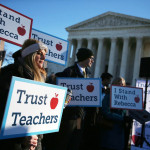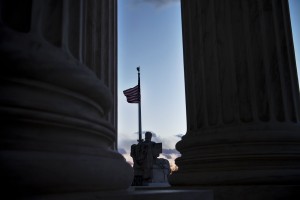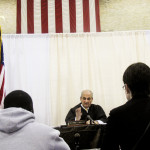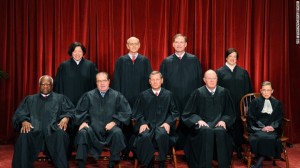Read the latest Huffington Post article, “Latino Community Rallies Around Clinton,” by Courts Monitor Publisher, Sara Warner. Sara provides her thoughts about the importance of the Latino community to the presidential election, as well as the implications it has on the U.S. Supreme Court and issues like immigration and civil rights.
Colorado City Settles ‘Debtors Prison’ Case
You can add Colorado Springs, Colo., to the list of American cities learning that turning “civil” cases like traffic tickets into jail-time cases might be illegal. National Public Radio did a deep-dive into the situation this week, offering the context that “… debtors’ prisons have long been illegal in the United States. But many courts across the country still send people to jail when they can’t pay their court fines. Last year, the Justice Department stepped in to stop the practice in Ferguson, Mo. And now, in a first, a U.S. city will pay out thousands of dollars to people who were wrongly sent to jail.”
The NPR story said that Colorado Springs and the American Civil Liberties Union of Colorado announced “… a settlement that will end the practice of jailing people too poor to pay their court fines. The city will even give payouts to people who were incorrectly sent to jail. Last year, the ACLU of Colorado discovered nearly 800 cases where people had gone to jail in Colorado Springs when they couldn’t pay their tickets for minor violations. Most of the people were homeless — and they were ticketed for things such as panhandling or sleeping in a park overnight. The settlement calls for people to receive $125 for each day they were in jail. One man featured in the story, illegally jailed after being fined for holding up a sign at roadside, will receive some $11,000.
NPR quoted ACLU attorney Mark Silverstein explaining that “… putting people in jail when they can’t pay their fines — without giving them alternative options such as community service — has been ruled unconstitutional by the U.S. Supreme Court” and also cited their previous work on the issue: An NPR investigative series in 2014 found the practice is widespread across the country. “The law is supposed to treat us equally,” Silverstein says. “So when people with means can simply pay a fine and move on and then the poor get sentenced to jail, because they’re poor, that’s a two-tiered system of justice that violates the principle of equal protection of the laws.”
That previous NPR investigation, which is truly alarming, noted that “… one of the first instances NPR found of fees charged to criminal defendants was in 1965 when California required payments to reimburse crime victims. By the 1980s, states started billing criminal defendants to reimburse taxpayers. Michigan, in 1984, passed the first law to charge inmates for some of the costs of their incarceration. By 1990, Texas reported that fees from offenders made up more than half the budget of the state’s probation agencies.” California now can charge people for their jail stays, public defender costs and other fees, as can 48 other states.
Read the Colorado Springs story here:
Colorado Springs Will Stop Jailing People Too Poor To Pay Court Fines
California Teacher’s Union First Post-Scalia Winner

Demonstrators supporting Rebecca Friedrichs, a plaintiff in the case, outside the Supreme Court in January. Photo Credit New York Times report, 3/29/16
When a case involving California public schoolteachers – and by implication any union’s ability to collect fees from workers who choose not to join and do not want to pay for collective bargaining agreements – was first argued before the U.S. Supreme Court back in January, it seemed headed for another 5-4 vote that would greatly diminish the power of collective bargaining organizations.
But now, in what the New York Times calls “… the starkest illustration yet of how the sudden death of Justice Antonin Scalia last month has blocked the power of the court’s four remaining conservatives to move the law to the right…” it has been upheld on a 4-to-4 vote.
The times reports that “… a ruling in [the union-opposed teachers] favor would have affected millions of government workers and weakened public-sector unions, which stood to lose fees both from workers who objected to the positions the unions take and from those who simply chose not to join while benefiting from the unions’ efforts on their behalf.”
Read the NYT take the landmark case here: Victory for Unions as Supreme Court, Scalia Gone, Ties 4-4
Justice Scalia Was Leader In Civil Justice Decisions

Photo Credit: The U.S. Supreme Court is seen on Saturday in Washington, DC, following the announcement of the death of Supreme Court Justice Antonin Scalia.
NPR report, 2/15/16
The political and criminal-law fallout from the sudden death of U.S. Supreme Court Justice Antonin Scalia is, of course, being widely discussed as President Obama prepares to nominate a successor. But NPR has done a good job at detailing a half-dozen cases that really illustrate how much Justice Scalia sculpted the modern civil litigation landscape.
For example, remember the huge Wal-Mart lawsuit over treatment of female workers? NPR backgrounded the case: “The issue before the Supreme Court was whether female employees as a group could be certified as a single class, suing Wal-Mart at a single trial. Lawyers for the women introduced evidence showing that female employees held two-thirds of the lowest-level hourly jobs at Wal-Mart, but only one-third of the management jobs, and that women overall were paid on average $1.16 per hour less than men in the same jobs, though the women had more seniority and higher performance ratings.”
Scalia was widely noted as a reason Wal-Mart prevailed in its appeal to the high court. Other cases of illustration, like Hobby Lobby and Citizen’s United, can be found here: 6 Major Supreme Court Cases That Would Have Been Different Without Scalia
Housing Rules Yet Another Huge SCOTUS 5-4 Decision


